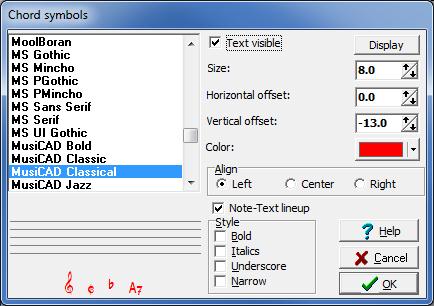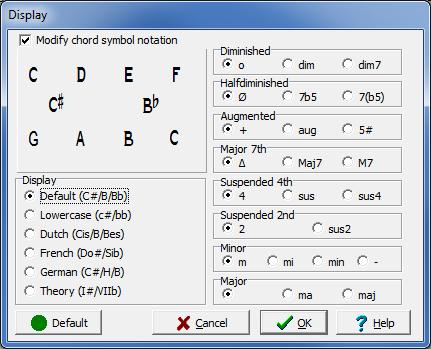Chord notation systems
Depending on country, instrument and music-style, different chord notation systems are in use.
Chord symbols are in heavy use in popular music (guitar-chords, keyboard).
How to play chords on your instrument is - of course - instrument dependant (fingering, chord_diagrams).
MusiCAD uses the anglo-american system by default.
Below you'll find a few often used chord-notation-systems:
| System | 0 | 1 | 2 | 3 | 4 | 5 | 6 | 7 | 8 | 9 | 10 | 11 |
| Anglo-American | C | C# | D | Eb | E | F | F# | G | G# | A | Bb | B |
| NL | C | Cis | D | Es | E | F | Fis | G | Gis | A | Bes | B |
| DE | C | C# | D | Eb | E | F | F | G | G# | A | B | H |
| Accordion | c | c# | d | eb | e | f | f# | g | g# | a | bb | b |
| BE / FR / ES / RU / GR / RO / HU | Do | Do# | Re | Mib | Mi | Fa | Fa# | Sol | Sol# | La | Sib | Si |
| Accordion FR | do | do# | re | mib | mi | fa | fa# | sol | sol# | la | sib | si |
| Music theory | I | I# | II | IIIb | III | IV | IV# | V | V# | VI | VIIb | VII |
Different - often conflicting - conventions are in use to denote minor, major, augmented, diminished, half-diminished, major seventh:
- use of upper case for major, lower case for minor;
- mi may denote minor as well as french mi-chord (E);
- upper case for bass notes, lower case for chords (accordion);
- maj can stand for major as well as major-seventh;
- a minus sign - can denote minor or diminished;
- a plus sign + can be major as well as augmented.
- Δ may be used for major as well as major 7th.
To select the preferred notation system go to the text attributes of the chord symbols in the text dialog and use the display button.
You will be shown a dialog like:
Choose the main display style and select how to display alterations:
- diminished
- half diminished
- augmented
- major seventh
- suspended chords
- minor
- major


